Introduction
Cristiano Ronaldo, often hailed as one of the greatest football players of all time, has become a global phenomenon. Known for his exceptional talent, relentless work ethic, and unmatched dedication, Ronaldo’s journey from a young boy in Madeira to an international superstar is nothing short of inspiring. Cristiano Ronaldo dos Santos Aveiro GOIH ComM (Portuguese pronunciation: born 5 February 1985) is a Portuguese professional footballer who plays as a forward for and captains both Saudi Pro League club Al Nassr and the Portugal national team.
Widely regarded as one of the greatest players of all time, Ronaldo has won numerous individual accolades throughout his career, such as five Ballon d’Or awards, a record three UEFA Men’s Player of the Year Awards, four European Golden Shoes, and was named five times the world’s best player by FIFA, the most by a European player.
Cristiano Ronaldo has won 33 trophies in his career, including seven league titles, five UEFA Champions Leagues, the UEFA European Championship and the UEFA Nations League. Ronaldo holds the records for most appearances (183), goals (140) and assists (42) in the Champions League, most appearances (30), assists (8), goals in the European Championship (14), international appearances (217) and international goals (135).
Cristiano Ronaldo is one of the few players to have made over 1,200 professional career appearances, the most by an outfield player, and has scored over 900 official senior career goals for club and country, making him the top goalscorer of all time.
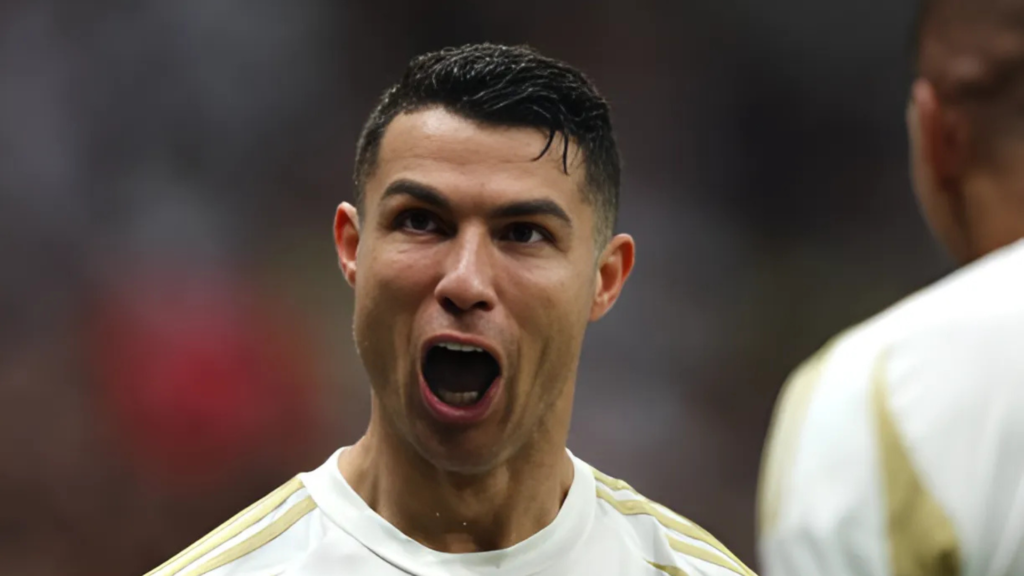
Cristiano Ronaldo began his senior career with Sporting CP, before signing with Manchester United in 2003, winning the FA Cup in his first season. He went on to win three consecutive Premier League titles, the Champions League and the FIFA Club World Cup; at age 23, he won his first Ballon d’Or. Ronaldo was the subject of the then-most expensive association football transfer when he signed for Real Madrid in 2009 in a transfer worth €94 million (£80 million).
Cristiano Ronaldo became a key contributor and formed an attacking trio with Karim Benzema and Gareth Bale which was integral to the team winning four Champions Leagues from 2014 to 2018, including La Décima. During this period, he won back-to-back Ballons d’Or in 2013 and 2014, and again in 2016 and 2017, and was runner-up three times behind Lionel Messi, his perceived career rival.
Cristiano Ronaldo also became the club’s all-time top goalscorer and the all-time top scorer in the Champions League, and finished as the competition’s top scorer for six consecutive seasons between 2012 and 2018. With Real, Ronaldo won four Champions Leagues, two La Liga titles, two Copas del Rey, two UEFA Super Cups and three Club World Cups. In 2018, he signed for Juventus in a transfer worth an initial €100 million (£88 million), the most expensive transfer for an Italian club and for a player over 30 years old.
Cristiano Ronaldo won two Serie A titles, two Supercoppa Italiana trophies and a Coppa Italia, became the inaugural Serie A Most Valuable Player, and the first footballer to finish as top scorer in the English, Spanish and Italian leagues. He returned to Manchester United in 2021, finishing his only full season as the club’s top scorer, before his contract was terminated in 2022. In 2023, he signed for Al Nassr.
Cristiano Ronaldo made his international debut for Portugal in 2003 at the age of 18 and has earned more than 200 caps, making him history’s most-capped male player. With 130 international goals, he is also the all-time top male goalscorer. Ronaldo has played in eleven major tournaments and scored in ten; he scored his first international goal at Euro 2004, where he helped Portugal reach the final.
Cristiano Ronaldo assumed captaincy of the national team in July 2008. In 2015, Ronaldo was named the best Portuguese player of all time by the Portuguese Football Federation. The following year, he led Portugal to their first major tournament title at Euro 2016, and received the Silver Boot as the second-highest goalscorer of the tournament.
This achievement saw him receive his fourth Ballon d’Or. He also led them to victory in the inaugural UEFA Nations League in 2019, receiving the top scorer award in the finals, and later received the Golden Boot as top scorer of Euro 2020. The same tournament, he broke the record of most international goals scored in men’s football and became the player with the most international caps in men’s football in 2023.
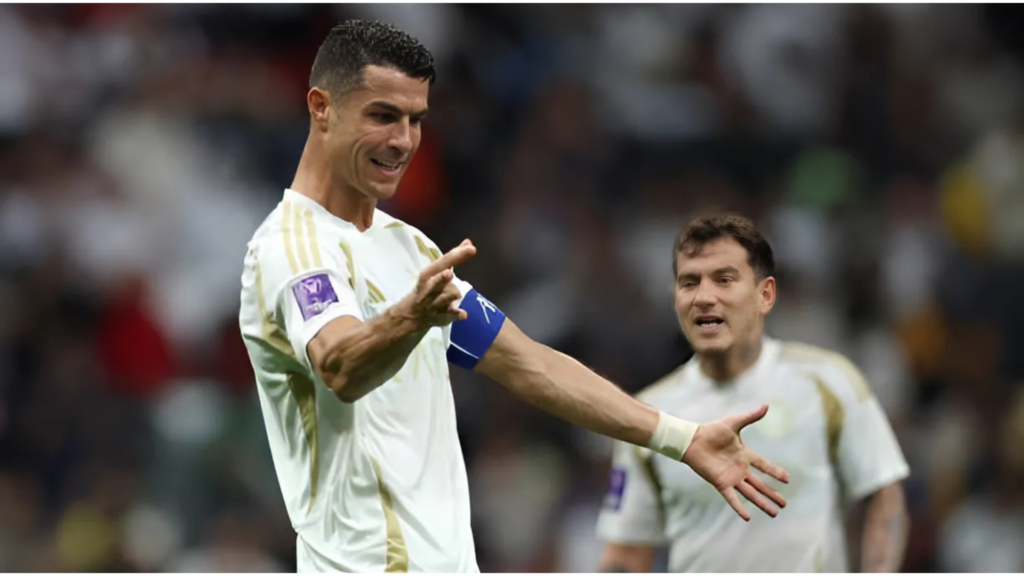
One of the world’s most marketable and famous athletes, Ronaldo was ranked the world’s highest-paid athlete by Forbes in 2016, 2017, 2023, and 2024 and the world’s most famous athlete by ESPN from 2016 to 2019. Time included him on their list of the 100 most influential people in the world in 2014. Ronaldo is the most popular sportsperson on social media: he counts over 1 billion total followers across Facebook, Twitter, YouTube and Instagram, making him the first person to achieve that feat. In 2020, Ronaldo was named to the Ballon d’Or Dream Team and he is the first footballer and the third sportsman to earn US$1 billion in his career.
Cristiano Ronaldo Early Life and Career Beginnings
Cristiano Ronaldo Born on February 5, 1985, in Funchal, Madeira, Cristiano Ronaldo dos Santos Aveiro showed an early passion for football. He joined the youth team of Andorinha at just eight years old before moving to Nacional. His talent quickly caught the attention of Sporting CP, where he honed his skills and made his professional debut at 17. Cristiano Ronaldo dos Santos Aveiro was born on 5 February 1985 in the São Pedro parish of Funchal, the capital of the Portuguese island of Madeira, and grew up in the nearby parish of Santo António.
Cristiano Ronaldo is the fourth and youngest child of Maria Dolores dos Santos Viveiros Aveiro, who worked as a cook in the hospitality industry and a cleaning woman, and José Dinis Aveiro, a municipal gardener at the Junta de Freguesia of Santo António and part-time kit man for football club Andorinha. His great-grandmother on his father’s side, Isabel da Piedade, an African woman, was born in the island of São Vicente, in what was then Portuguese Cape Verde, and moved to Madeira Island at 16.
Cristiano Ronaldo has one older brother, Hugo, and two older sisters, Elma and Liliana Cátia “Kátia”. He was named after actor and U.S. President Ronald Reagan, whom his father was a fan of. His mother revealed that she wanted to abort him due to poverty, his father’s alcoholism, and having too many children already, but her doctor refused to perform the procedure. Ronaldo grew up in an impoverished Catholic home, sharing a room with all his siblings.
As a child, Cristiano Ronaldo played for Andorinha from 1992 to 1995, where his father was the kit man, and later spent two years with Nacional. In 1997, aged 12, he went on a three-day trial with Sporting CP, who signed him for a fee of £1,500. He subsequently moved from Madeira to Lisbon to join Sporting CP’s youth system.
By age 14, while struggling with his school duties and responsibilities in Escola EB2 de Telheiras, his school in the Telheiras area of Lisbon, Ronaldo believed he had the ability to play semi-professionally and agreed with his mother and his tutor at Sporting CP, Leonel Pontes, to cease his education to focus entirely on football. With a troubled life as a student, and although living in Lisbon area away from his Madeiran family, he did not complete schooling beyond the 6th grade.
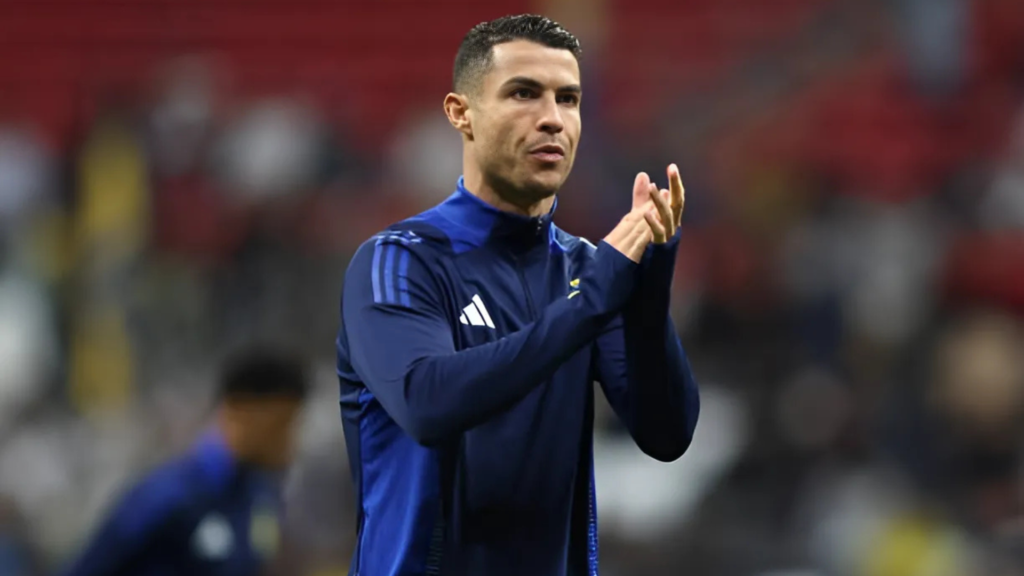
While popular with other students at school, he had been expelled after throwing a chair at his teacher, who he said had “disrespected” him. One year later, he was diagnosed with tachycardia, a condition that could have forced him to give up playing football. Ronaldo underwent heart surgery where a laser was used to cauterise multiple cardiac pathways into one, altering his resting heart rate.
Cristiano Ronaldo was discharged from the hospital hours after the procedure and resumed training a few days later. In 2021, Cristiano Ronaldo’s mother, Dolores Aveiro, stated in an interview for Sporting CP’s official television channel (Sporting TV) that her son would be a bricklayer if he hadn’t become a professional football player.
Growing up, Ronaldo idolised the Brazilian footballers Ronaldinho and Ronaldo Nazário, and has described them as leaving “a beautiful history in football”.
Cristiano Ronaldo in Rise to Stardom
Cristiano Ronaldo’s breakthrough came in 2003 when he signed with Manchester United. Under the mentorship of Sir Alex Ferguson, Ronaldo transformed into a world-class player. He helped the team win three Premier League titles, an FA Cup, and the UEFA Champions League. His incredible performances earned him his first Ballon d’Or in 2008.
Sporting CP (2002–2003)
After impressing in Sporting’s youth teams, he was promoted to the main team by first-team manager László Bölöni. At age 17, on 14 August 2002, he played his first official match for the first team, in a UEFA Champions League qualifying round at José Alvalade Stadium against Inter Milan, and his Primeira Liga debut, took place a month later against Braga, and on 7 October, he scored two goals against Moreirense in their 3–0 win. Over the course of the 2002–03 season, his representatives suggested the player to Liverpool manager Gérard Houllier and Barcelona president Joan Laporta. Manager Arsène Wenger, who was interested in signing Ronaldo, met with him at Arsenal’s stadium in November to discuss a possible transfer.
Manchester United manager Alex Ferguson was determined to acquire Ronaldo on a permanent move urgently, after Sporting defeated United 3–1 at the inauguration of the Estádio José Alvalade on 6 August 2003. Initially, United had planned to sign Ronaldo and loan him back to Sporting for a year. Having been impressed by him, the United players urged Ferguson to sign him. After the game, Ferguson agreed to pay Sporting £12.24 million for what he considered to be “one of the most exciting young players” he had ever seen.
Cristiano Ronaldo in Manchester United (2003–2009)
2003–2007: Development and breakthrough
Manchester United’s signed Cristiano Ronaldo for £12 million on 12 August 2003, an England record for a teenager. This also made him the first Portuguese player to sign for the club.
Although he requested the number 28, his number at Sporting, he received the squad number 7 shirt, which had previously been worn by such United players as George Best, Eric Cantona and David Beckham. Wearing the number 7 became an extra source of motivation for Ronaldo. A key element in his development during his time in England proved to be Ferguson, of whom he later said: “He’s been my father in sport, one of the most important and influential factors in my career.”
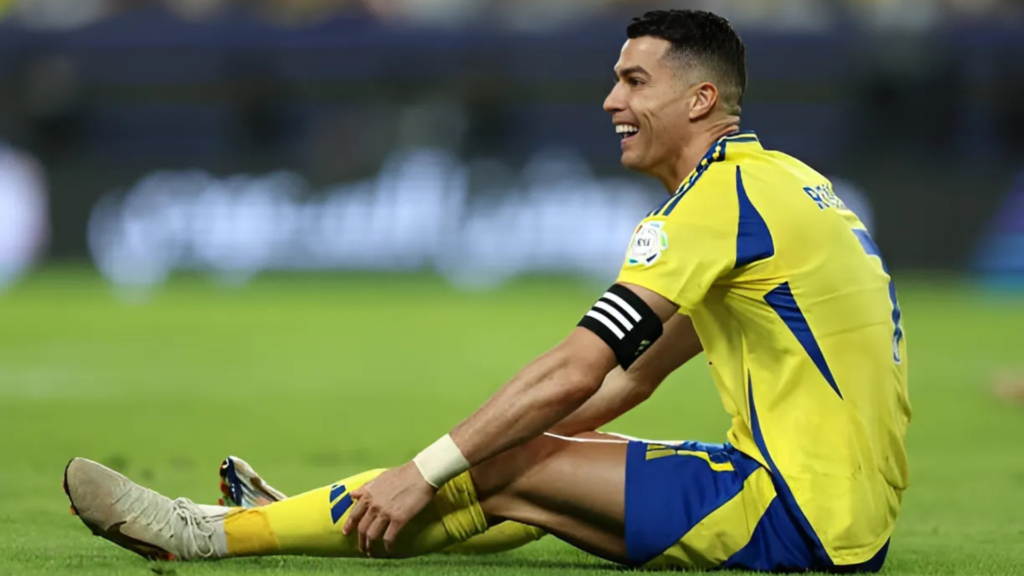
Cristiano Ronaldo made his debut as a substitute in a 4–0 home win over Bolton Wanderers in the Premier League on 16 August 2003. His performance earned praise from Best, who hailed it as “undoubtedly the most exciting debut” he had ever seen. Ronaldo scored his first goal for Manchester United with a free-kick in a 3–0 win over Portsmouth on 1 November.
Towards the end of the season, he received the first red card of his career. Ronaldo ended his first season in English football by scoring the opening goal in United’s 3–0 win over Millwall in the 2004 FA Cup Final, earning his first trophy. BBC pundit Alan Hansen described him as the star of the final. The British press had been critical of Ronaldo during the season for his “elaborate” step-overs in trying to beat opponents, but teammate Gary Neville said he was “not a show pony, but the real thing”, and predicted he would become a world-class player.
At the start of 2005, Ronaldo played two of his best matches of the 2004–05 season, producing a goal and an assist against Aston Villa and scoring twice against rivals Arsenal. Ronaldo won his second trophy in English football, the Football League Cup, after scoring the third goal in United’s 4–0 final win over Wigan Athletic.
During his third season in England, Ronaldo was involved in several incidents. Ronaldo clashed with a teammate, striker Ruud van Nistelrooy, who took offence at the winger’s showboating style of play. Following the 2006 FIFA World Cup, in which he was involved in an incident where club teammate Wayne Rooney was sent off, Ronaldo publicly asked for a transfer, lamenting the lack of support he felt he had received from the club over the incident. United denied the possibility of him leaving the club.
Although his World Cup altercation with Rooney resulted in Ronaldo being booed throughout the 2006–07 season, it proved to be his break-out year, as he broke the 20-goal barrier for the first time and won his first Premier League title.
Cristiano Ronaldo in 2007–2009: Collective and individual success and Ballon d’Or
In the 2006–07 season, he amassed a host of personal awards for the season, winning the Professional Footballers’ Association’s Player’s Player, Fans’ Player, Young Player of the Year awards, and the Football Writers’ Association’s Footballer of the Year award, becoming the first player to win all four main PFA and FWA honours. Ronaldo was named runner-up to Kaká for the 2007 Ballon d’Or, and came third, behind Kaká and Lionel Messi, in the running for the 2007 FIFA World Player of the Year award.
Cristiano Ronaldo scored his first hat-trick for United in a 6–0 win against Newcastle United on 12 January 2008. His 31 league goals earned him the Premier League Golden Boot, as well as the European Golden Shoe, which made him the first winger to win the latter award. He additionally received the PFA Players’ Player of the Year and FWA Footballer of the Year awards for the second consecutive season.
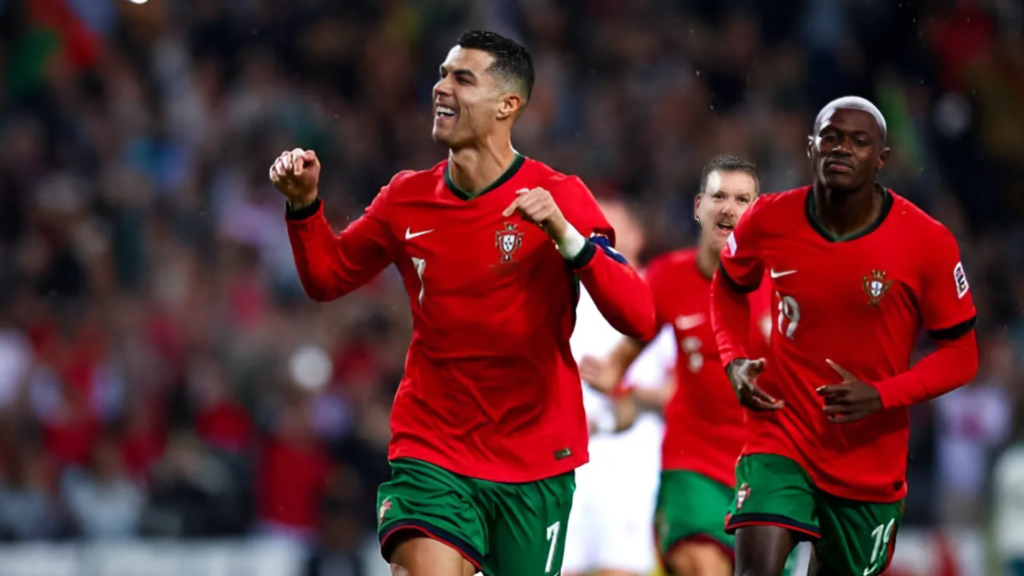
United reached the final against Chelsea in Moscow on 21 May, where, despite his opening goal being negated by an equaliser and his penalty kick being saved in the shoot-out, United emerged victorious, winning 6–5 on penalties after a 1–1 draw at the end of 120 minutes. As the Champions League top scorer, Ronaldo was named the UEFA Club Footballer of the Year. With his 2008 Ballon d’Or and 2008 FIFA World Player of the Year, Ronaldo became United’s first Ballon d’Or winner since Best in 1968, and the first Premier League player to be named the FIFA World Player of the Year.
Shortly after, Ronaldo was linked to a move to Real Madrid, United filed a tampering complaint with governing body FIFA over Madrid’s alleged pursuit of their player, but they declined to take action. and he remained at United for another year. His match-winning goal in the second leg against Porto, a 40-yard strike, earned him the inaugural FIFA Puskás Award, presented by FIFA in recognition of the best goal of the year; he later called it the best goal he had ever scored. United advanced to the final in Rome, where he made little impact in United’s 2–0 defeat to Barcelona.
Cristiano Ronaldo in The Real Madrid Era
In 2009, Cristiano Ronaldo made a record-breaking transfer to Real Madrid, solidifying his place among football’s elite. During his nine-year tenure, he scored an astonishing 450 goals in 438 appearances. Ronaldo led the team to four Champions League titles and won four more Ballon d’Or awards during this period. Real Madrid (2009–2018)
Cristiano Ronaldo in 2009–2015: World record transfer and consecutive Ballon d’Or wins
In 2009, Cristiano Ronaldo transferred to Real Madrid for a then world record £80 million. At least 80,000 fans attended his presentation at the Santiago Bernabéu, surpassing the 25-year record of 75,000 fans who had welcomed Diego Maradona at Napoli.
Cristiano Ronaldo made his La Liga debut against Deportivo La Coruña on 29 August, scoring a penalty in a 3–2 home win. He scored in each of his first four league games, the first Madrid player to do so. His first Champions League goals for the club followed with two free kicks in the first group match against Zürich. His strong start to the season was interrupted when he suffered an ankle injury in October while on international duty, which kept him sidelined for seven weeks. Despite scoring 33 goals in all competitions and contributing to Real Madrid’s 96 points in La Liga, his first season with Madrid ended trophyless.
Following Raúl’s departure, Cristiano Ronaldo was given No. 7 for the 2010–11 season and scored 53 goals, helping Madrid win the Copa del Rey, scoring the winning goal against rivals Barcelona in the El Clásico, his first trophy with Madrid. He also became the first player in La Liga to score 40 goals. In addition to the Pichichi Trophy, Ronaldo won the European Golden Shoe for a second time, becoming the first player to win the award in different leagues.
The following season saw Cristiano Ronaldo score 60 goals across all competitions, leading Madrid to their first league title in four years with a record 100 points and his runner-up finish to Lionel Messi in the 2011 FIFA Ballon d’Or.
Cristiano Ronaldo scored his 100th league goal for Madrid in a 5–1 win over Real Sociedad on 24 March 2012, breaking the previous club record held by Ferenc Puskás. In the 2012–13 season, he scored his first hat-trick in the Champions League in a 4–1 win over Ajax. Four days later, he became the first player to score in six successive Clásicos when he hit a brace in a 2–2 draw at Camp Nou. His performances again saw Ronaldo voted second in the running for the 2012 FIFA Ballon d’Or, behind four-time winner Messi.
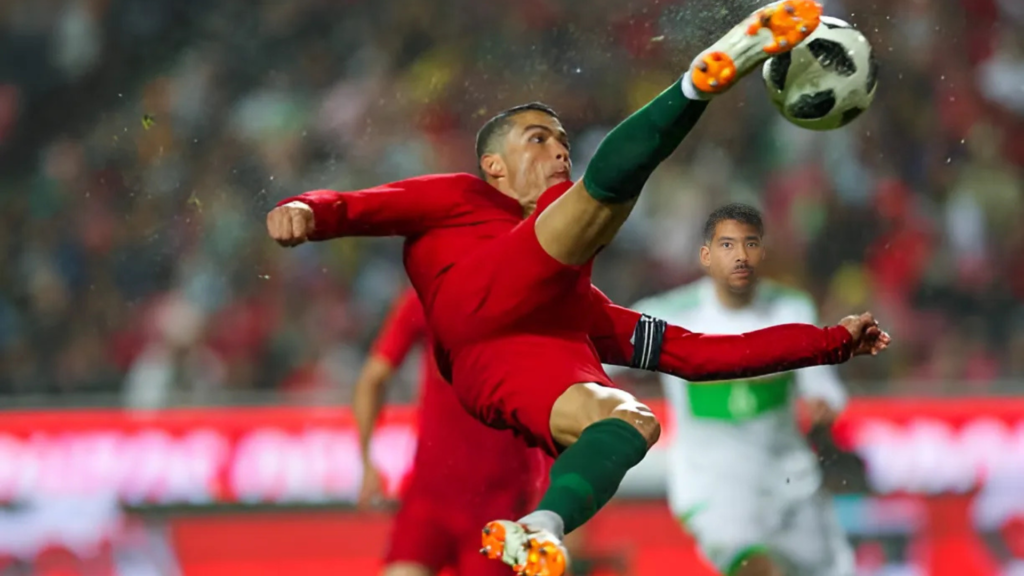
Following the 2012–13 winter break, Cristiano Ronaldo captained Madrid for the first time in an official match, scoring twice to lift 10-man Madrid to a 4–3 win over Sociedad on 6 January. He subsequently became the first non-Spanish player in 60 years to captain Madrid in El Clasico on 30 January, a match which also marked his 500th club appearance.
In 2013–14 season, Cristiano Ronaldo was joined at the club by winger Gareth Bale and together with striker Karim Benzema, they formed an attacking trio popularly dubbed “BBC”, an acronym of Bale, Benzema and Cristiano, and a play on the name of the British public service broadcaster, the British Broadcasting Corporation (BBC). He continued prolific scoring, with 69 goals in 2013, winning the 2013 FIFA Ballon d’Or, and the FIFA World Player of the Year award, for the first time in his career.
Concurrently with his individual achievements, Ronaldo enjoyed his greatest team success in Spain to date, as he helped Madrid win La Décima, their tenth European Cup, scoring a penalty in the 120th minute of the 4–1 final win over city rivals Atlético Madrid, becoming the first player to score in two European Cup finals for two different winning teams.
As the competition’s top goalscorer for the third time, with a record 17 goals, he was named the UEFA Best Player in Europe. Ronaldo scored 31 goals in 30 league games, which earned him the Pichichi and the European Golden Shoe, along with Liverpool’s Luis Suárez On 4 May, Ronaldo scored a back-heeled volley in the closing moments of the match against Valencia, voted goal of the season by the Liga Nacional de Fútbol Profesional (LFP), giving him the Best Player in La Liga award.
During the 2014–15 season, Ronaldo set a new personal best of 61 goals, and after winning the 2014 FIFA Club World Cup, Ronaldo received the 2014 Ballon d’Or, joining Johan Cruyff, Michel Platini and Marco van Basten as a three-time recipient. Madrid finished in second place in La Liga and exited at the semi-final stage in the Champions League.
With 10 goals, he finished as top scorer for a third consecutive season, alongside Messi and Neymar. On 5 April, he scored five goals in a game for the first time in his career, including an eight-minute hat-trick, in a 9–1 rout of Granada. His 300th goal for his club followed three days later in a 2–0 win against Rayo Vallecano. He finished the season with 48 goals, winning a second consecutive Pichichi and the European Golden Shoe for a record fourth time.
Cristiano Ronaldo in 2015–2018: All-time Madrid top scorer and Fifth Ballon d’Or
Cristiano Ronaldo became Real Madrid’s all-time top scorer on 12 September 2015 against Espanyol, netting 230 goals in 203 matches, surpassing the previous record holder, Raúl. Ronaldo also became the all-time top scorer in the Champions League with a hat-trick in the first group match against Shakhtar Donetsk, having finished the previous season level with Messi on 77 goals.
Two goals against Malmö FF in a 2–0 away win on 30 September saw him reach the milestone of 500 career goals for club and country. He won the 2016 Ballon d’Or, his fourth, and the inaugural 2016 The Best FIFA Men’s Player, a revival of the former FIFA World Player of the Year, largely owing to his success with Portugal in winning Euro 2016.
In the 2016–17 UEFA Champions League quarter-finals against Bayern in April, Ronaldo scored both goals in a 2–1 away win which saw him make history by becoming the first player to reach 100 goals in UEFA club competition. On 17 May, Ronaldo overtook Jimmy Greaves as the all-time top scorer in the top five European leagues, scoring twice against Celta de Vigo.
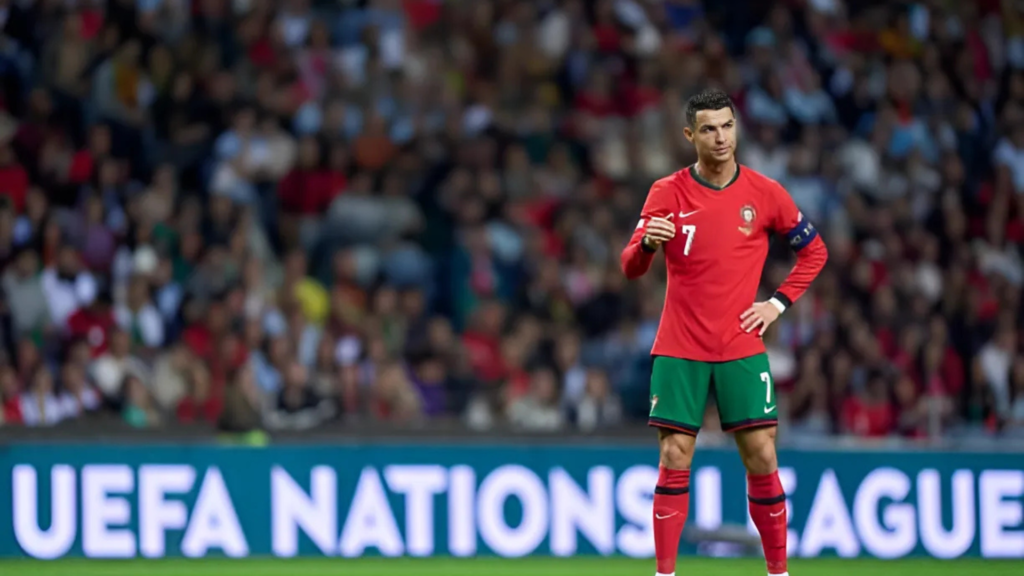
He finished the season with 42 goals in all competitions as he helped Madrid to win their first La Liga title since 2012. In the Champions League Final, Ronaldo scored two goals in a 4–1 victory over Juventus to take him to 12 goals for the season, making him the competition’s top goalscorer for the fifth straight season (sixth overall), as well as the first player to score in three finals in the Champions League era; the second goal was the 600th of his senior career. Madrid also became the first team to win back-to-back finals in the Champions League era.
On 23 October, his performances throughout 2017 saw him awarded The Best FIFA Men’s Player award for the second consecutive year. A day later, Ronaldo won the 2017 Ballon d’Or, receiving his fifth-time award on the Eiffel Tower in Paris. On 3 April 2024, Ronaldo scored the first two goals in a 3–0 away win against Juventus in the quarter-finals of the 2017–18 UEFA Champions League, with his second goal being an acrobatic bicycle kick.
Described as a “PlayStation goal” by Juventus defender Andrea Barzagli, with Ronaldo’s foot approximately 7 ft 7 in (2.31 m) off the ground, it garnered him a standing ovation from the opposing fans in the stadium as well as a plethora of plaudits from peers, pundits and coaches. In the final on 26 May, Madrid defeated Liverpool 3–1, winning Ronaldo his fifth Champions League title, the first player to do so. He finished as the top scorer of the tournament for the sixth consecutive season with 15 goals. After the final, Ronaldo referred to his time with Madrid in the past tense, sparking speculation that he could leave the club.
Cristiano Ronaldo in Juventus and Beyond
Ronaldo’s move to Juventus in 2018 showcased his adaptability and commitment to excellence. In Italy, he won multiple Serie A titles and continued to break records. In 2021, he made an emotional return to Manchester United before embarking on a new chapter with Al-Nassr in Saudi Arabia.
Ronaldo joined Juventus in 2018 for €100 million, the transfer was the highest ever for a player over 30 years old and the highest paid by an Italian club. Upon signing, Ronaldo cited his need for a new challenge as his rationale for departing Madrid, but later attributed the transfer to the lack of support he felt was shown by club president Florentino Pérez.
Cristiano Ronaldo in 2018–2020: Consecutive Serie A titles
On 18 August, Ronaldo made his debut in a 3–2 away win against Chievo Verona. On 19 September, in his first Champions League match for Juve, he was sent off against Valencia, his first red card in 154 Champions League appearances. In the reverse (home) leg against Valencia, Cristiano won 100 Champions League matches, becoming the first ever player to do so.
Ronaldo won his first trophy with the club on 16 January 2019, the 2018 Supercoppa Italiana, after he scored the only goal from a header against AC Milan. On 10 February, Ronaldo scored in a 3–0 win over Sassuolo, the ninth consecutive away game in which he had scored in the league, equalling Giuseppe Signori’s single season Serie A record of most consecutive away games with at least one goal.
On 12 March, Ronaldo scored a hat-trick in a 3–0 home win against Atlético in the second leg of the Champions League round of 16, helping Juventus overcome a two-goal deficit to reach the quarter-finals. On 20 April, Ronaldo played in the scudetto clinching game against Fiorentina, as Juventus won their eighth successive title after a 2–1 home win, thereby becoming the first player to win league titles in England, Spain and Italy. With 21 goals and eight assists, Ronaldo won the league award for Most Valuable Player.
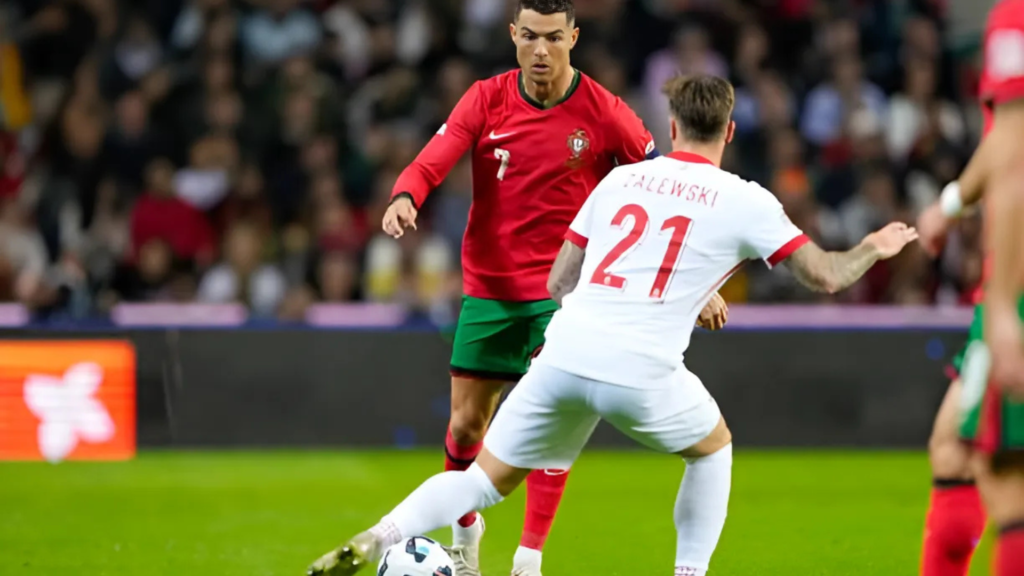
On 1 October, he reached several milestones in Juventus’s 3–0 Champions League group stage win over Bayer Leverkusen including breaking Iker Casillas’ record for most Champions League wins of all time. On 18 December, Ronaldo leapt to a height of 8 ft 5 in (2.57 m), higher than the crossbar, to head the winning goal in a 2–1 away win against Sampdoria. He scored his first Serie A hat-trick on 6 January 2020, in a 4–0 home win against Cagliari and became only the second player to score hat-tricks in the Premier League, La Liga and Serie A.
On 22 February, Ronaldo scored for a record-equalling 11th consecutive league game, alongside Gabriel Batistuta and Fabio Quagliarella, in what was his 1,000th senior professional game, a 2–1 away win against SPAL. On 22 June, he scored a penalty in a 2–0 away win over Bologna, overtaking Rui Costa to become the highest scoring Portuguese player in Serie A history. On 20 July, Ronaldo scored twice in a 2–1 home win over Lazio; his first goal was his 50th in Serie A.
He became the first player in history to reach 50 goals in the Premier League, La Liga and Serie A, and becoming the second player after Edin Džeko to score 50 goals in three of Europe’s top five major leagues. Moreover, he became the oldest player, at the age of 35 years and 166 days, to score over 30 goals in one of the five top European leagues since Ronnie Rooke with Arsenal in 1948.
On 26 July, Ronaldo scored the opening goal in a 2–0 home win over Sampdoria as Juventus were crowned Serie A champions for a ninth consecutive time. On 7 August, Ronaldo scored a brace in a 2–1 home win against Lyon in the second leg of the Champions League round of 16, which saw him finish the season with 37 goals in all competitions; the tally allowed him to break Borel’s club record of 36 goals in a single season.
Cristiano Ronaldo in 2020–2021: 100 Juve goals, Capocannoniere, and departure
Ronaldo played his 100th match in all competitions for Juventus on 13 December, scoring two penalties in a 3–1 away win over Genoa in the league to bring his goal tally to 79. On 2 March 2021, he scored a goal in a 3–0 win over Spezia in his 600th league match, to become the first player to score at least 20 goals in 12 consecutive seasons in the top five leagues of Europe.
On 12 May, Ronaldo scored a goal in a 3–1 away win over Sassuolo to reach his 100th goal for Juventus in all competitions on his 131st appearance, becoming the fastest Juventus player to achieve the feat. With Juventus’s victory in the 2021 Coppa Italia Final on 19 May, Ronaldo became the first player in history to win every major domestic trophy in England, Spain and Italy. Ronaldo ended the season with 29 league goals, winning the Capocannoniere award for highest goalscorer and becoming the first footballer to finish as top scorer in the English, Spanish and Italian leagues.
The start of the following season came amid reports Ronaldo would depart the club before the closure of the transfer window, despite Ronaldo and his agent Jorge Mendes reaching a verbal agreement with Manchester City over personal terms, but the club pulled out of the deal, and later it was confirmed that City’s rivals Manchester United, Ronaldo’s former club, were in advanced talks to sign him, while former manager Alex Ferguson and several ex-teammates had been in contact to persuade him to re-sign for United.
Cristiano Ronaldo in Return to Manchester United (2021–2022)
On 27 August 2021, Manchester United announced they had reached an agreement with Juventus to re-sign Ronaldo, subject to agreement of personal terms, visa and medical. Ronaldo was given the number 7 shirt after Edinson Cavani agreed to switch to 21. The first 24 hours of Ronaldo’s shirt sales was reported to have broken the all-time record following a transfer, overtaking Messi after his move to Paris Saint-Germain.
On 11 September, Ronaldo made his second debut at Old Trafford, scoring the opening two goals in a 4–1 league victory against Newcastle United. On 29 September, he scored a last-minute winner in United’s 2–1 victory at home to Villarreal in the Champions League, and overtook Iker Casillas as the player with the most appearances in the competition. Ronaldo proved to be crucial in the next Champions League fixtures, scoring various last minute goals to help United qualify for the round of 16 as group winners.
On 2 December, Ronaldo netted two goals in a 3–2 home league win against Arsenal, which saw him surpass 800 career goals. Struggles ensued, with a fractured relationship with his teammates and interim manager, continuing for two months, until he scored in United’s 2–0 win at home versus Brighton & Hove Albion on 15 February 2022, his first in the new year.
He finished the season with 24 goals in all competitions being named in the Premier League Team of the Year and the winner of United’s Sir Matt Busby Player of the Year award, but United finished in a disappointing sixth place and qualified for the UEFA Europa League; as a result, Ronaldo went trophyless for the first time since 2010.
After growing dissatisfaction with the direction of United on and off the field, Ronaldo desired to leave to join a club competing in the Champions League, but a move failed to materialise, with various European clubs refusing a transfer, due to his age, overall cost of a transfer and high wage demands. Shortly after, he fell out with manager Erik ten Hag who used him as a substitute, leading United to terminate his contract on 22 November, following an interview with Piers Morgan, where Ronaldo said that he felt “betrayed” by Ten Hag and criticized the management of the club.
Cristiano Ronaldo in Al Nassr (2023–present)
On 30 December 2022, Saudi club Al-Nassr reached an agreement for Ronaldo to join the club, signing a contract until 2025. Ronaldo received the highest football salary ever, at €200 million per year, including a guaranteed football salary of €90 million, with commercial and sponsorship deals bringing his total annual salary to €200 million.
He made his debut for Al Nassr on 22 January 2023, as club captain, playing the full 90 minutes of a 1–0 win over Al-Ettifaq, and scored his first goal in a 2–2 draw against Al-Fateh by converting a last-minute penalty. On 9 February, Ronaldo scored all four goals in a 4–0 win over Al Wehda, his first goal of the match being his 500th career league goal. According to the BBC, Ronaldo’s transfer to Al-Nassr led a “revolution” in Asian football, with many players from other leagues, particularly those in Europe, transferring to Saudi Pro League clubs for the 2023–24 season.
In the final of the Arab Club Champions Cup on 12 August, Ronaldo scored both goals as they defeated rivals Al-Hilal 2–1 after extra time. Ronaldo scored six goals in the competition. At the close of the year, Ronaldo scored 54 goals in all competitions for Al-Nassr and Portugal, making him the outright top scorer in 2023, reaching the same goalscoring record as in 2016.
On 27 May 2024, in Al Nassr’s home fixture against Al-Ittihad, Ronaldo scored his 34th and 35th league goals of the campaign, surpassing Abderrazak Hamdallah’s record for the most goals scored in a single Saudi Pro League season. He also became the first footballer to finish as top scorer in four different leagues, the English, Spanish, Italian and Saudi leagues. On 31 May, in a 5–4 penalty shoot-out defeat to Al-Hilal in the 2024 King Cup final following a 1–1 draw after extra-time (in which he scored his side’s second spot kick), he equalled Rogério Ceni’s record for most top-level matches by a male professional footballer (1,225).
International Glory of Cristiano Ronaldo
Cristiano Ronaldo’s impact isn’t limited to club football. Representing Portugal, he has achieved remarkable success, including winning the UEFA European Championship in 2016 and the UEFA Nations League in 2019. Ronaldo is also the all-time leading scorer in international football, a testament to his longevity and skill. At the age of 18, Ronaldo made his debut for Portugal as a substitute against Kazakhstan on 20 August 2003.
At UEFA Euro 2004, he scored his first international goal in a 2–1 group stage loss to Greece in his eighth international appearance. Despite Portugal losing to Greece again in the final, Ronaldo made the team of the tournament, with two assists and two goals.
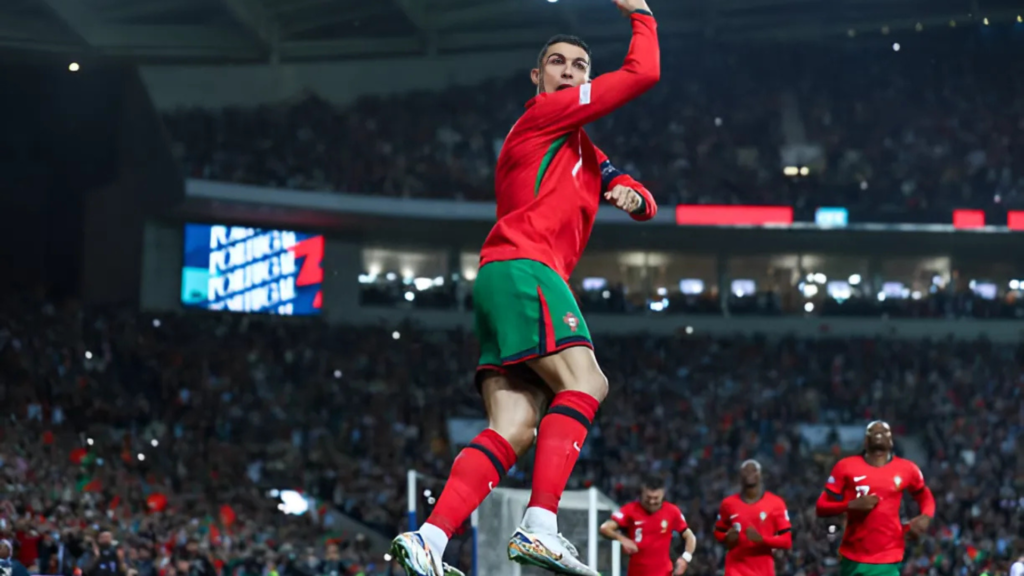
In the 2006 FIFA World Cup, at the age of 21 years and 132 days, Ronaldo became the youngest ever goalscorer for Portugal at a World Cup finals. Portugal reached the semi-finals, where Portugal lost to France, with Ronaldo being booed during their defeat, due to an incident that occurred in the quarter-finals against England. FIFA’s Technical Study Group overlooked him for the tournament’s Best Young Player award and handed it to Germany’s Lukas Podolski, citing his behaviour as a factor in the decision.
On 6 February 2007, Cristiano captained Portugal for the first time in a friendly against Brazil. He wore the number 7 shirt ahead of UEFA Euro 2008. Despite scoring eight goals in qualifications, the second-highest tally, he scored just one goal in the finals, netting the second goal of Portugal’s 3–1 win in the group stage game against the Czech Republic. Portugal were eliminated in the quarter-finals after a 3–2 loss to Germaney.
Ronaldo failed to score in 2010 World Cup qualifying. He scored only one goal in the 2010 World Cup finals; despite this, he was named man of the match in all three group stage matches, against Ivory Coast, North Korea and Brazil. His only goal of the tournament came in their 7–0 demolishing of North Korea, which was his first international goal in 16 months. Two years later, in UEFA Euro 2012, Ronaldo was joint top scorer with three goals, enough for him to be included in the team of the tournament.
During qualification for the 2014 FIFA World Cup, Ronaldo scored eight goals. Despite this, Portugal did not qualify directly; Ronaldo scored all four goals against Sweden in the play-off to qualify. At the tournament in Brazil, Ronaldo assisted a last-minute 2–2 equaliser against the United States, and scored an 80th-minute winner in a 2–1 win over Ghana.
In 2016, Ronaldo led Portugal to their first-ever trophy at the UEFA Euro 2016, although he was subbed off in the 25th minute in the final against hosts France. He received the Silver Boot as the second-highest goalscorer, which gave him his fourth Ballon d’Or later that year. With the win, Portugal qualified and made its only appearance in the FIFA Confederations Cup held in Russia, where they finished in third place, with Ronaldo being named man of the match in all three of Portugal’s group stage matches.
In the 2018 World Cup, Ronaldo became the oldest player to score a hat-trick in a World Cup match, in a 3–3 draw against Spain. The following match, Ronaldo scored the only goal in a 1–0 win against Morocco, breaking Puskás’ record as the highest European goalscorer of all time, with 85 international goals. For his performances in the tournament, Ronaldo was named in the World Cup Dream Team.
Ronaldo led Portugal to victory in the inaugural UEFA Nations League in 2019, receiving the top scorer award in the finals, and received the Golden Boot as top scorer of Euro 2020. Ronaldo also became the first player to score at five European Championships. On 23 June 2021, Ronaldo scored two goals in the Euro 2020 match against France, breaking the men’s goalscoring record previously held by Ali Daei.
On 9 October, he scored the opening goal in a 3–0 friendly win over Qatar at the Estádio Algarve; with his 181st international appearance, he also overtook Sergio Ramos’s record for the most international caps received by a European player. In the following match against Luxembourg on 12 October, also played at the Estádio Algarve, Ronaldo scored a hat-trick in a 5–0 win for Portugal, thus becoming the first player to score 10 hat-tricks in men’s international football.
In the 2022 World Cup, on 24 November, Ronaldo became the first player to score at five World Cups, netting a penalty against Ghana. Following a dispute with manager Fernando Santos, after their last group game against South Korea, he was dropped from the starting line-up for Portugal’s last 16 match, marking the first time since Euro 2008 that he had not started a game for Portugal in a major international tournament, and the first time Portugal had started a knockout game without Ronaldo in the starting line-up at an international tournament since Euro 2000.
On 23 March 2023, Ronaldo scored a brace against Liechtenstein as he earned his 197th overall cap to become the most capped male footballer of all time. On 20 June, Ronaldo made his 200th appearance for his national team, scoring the only goal of an away win over Iceland, in the Euro qualifiers, as he became the first player in the history of men’s international football to make 200 appearances for his country. On 16 October, Portugal secured first place in their qualifying group, following a 5–0 away victory over Bosnia and Herzegovina, with Ronaldo scoring twice. The landmark goals saw him score in more than 100 goals in each of the last three decades (2000s, 2010s, 2020s).
With his start in Portugal’s UEFA Euro 2024 opener against the Czech Republic, Ronaldo became the first player to feature in six European Championships, having previously been the first player to appear in five. Later that year, on 5 September, he scored his 900th career goal in a 2–1 victory over Croatia in the UEFA Nations League.
Achievements and Records of Cristiano Ronaldo
Cristiano Ronaldo’s career is filled with incredible milestones:
- Five Ballon d’Or awards
- Five UEFA Champions League titles
- Over 850 career goals
- Most goals in Champions League history
- Top scorer in international football
Conclusion
Cristiano Ronaldo’s journey is a testament to what can be achieved through hard work and passion. As one of the most celebrated athletes in history, his influence on football and global culture will endure for generations.

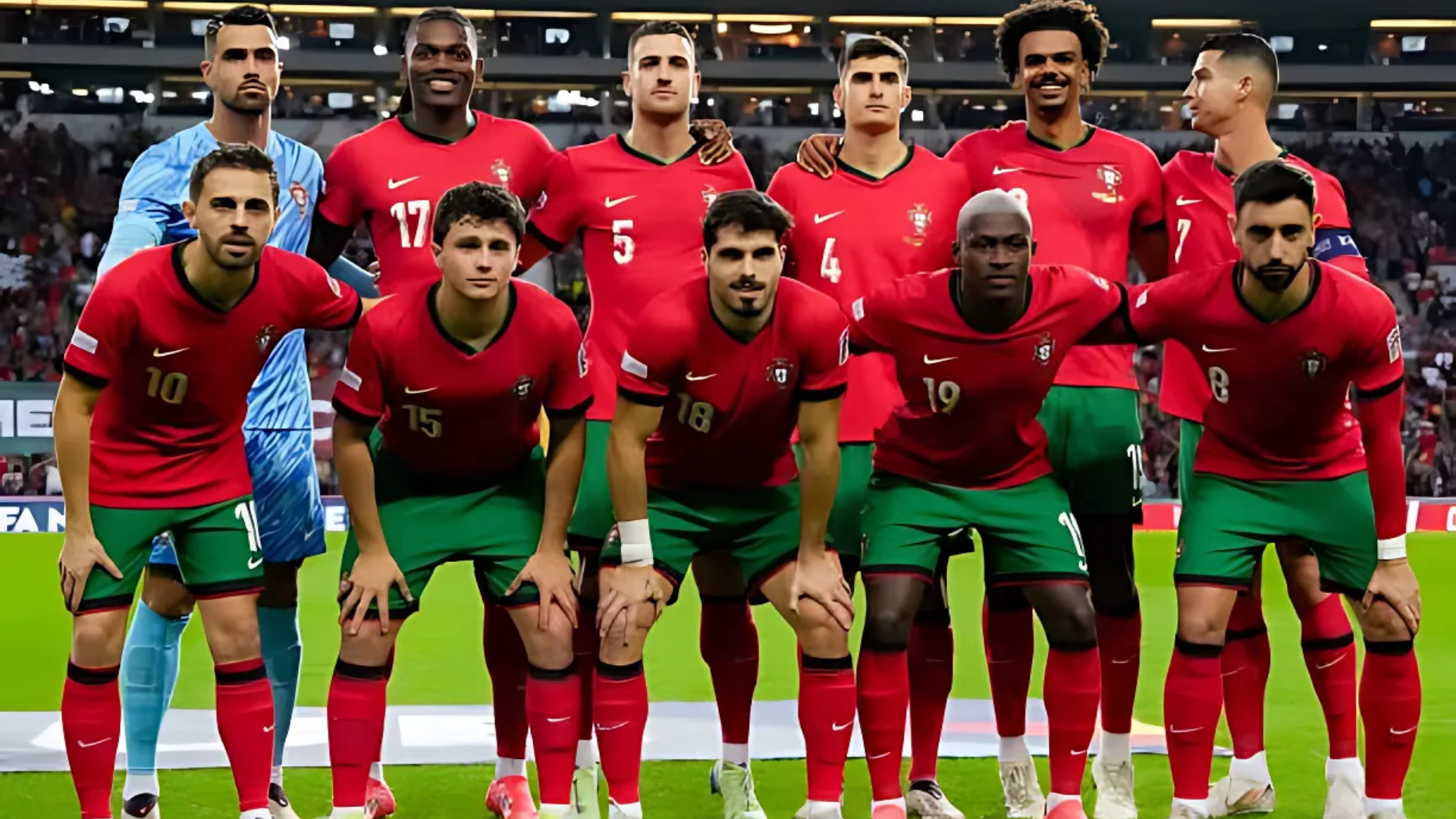
2 thoughts on “Cristiano Ronaldo: A Legendary Football Icon”